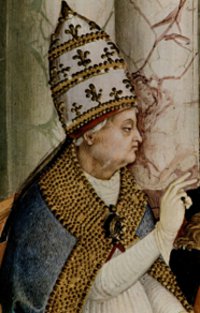The university’s founders
Various clergymen and burghers of the city gained their first experiences with a (council) university in the city during the Council of Basel. Just a few years later, they would become the chief proponents of founding a university in Basel.
Enea Silvia Piccolomini/Pope Pius II
Enea Silvio Piccolomini (1405-1464) attended the Council of Basel from 1432 as a companion of Cardinal Domenico Capranica and became the secretary to the antipope Felix V in 1440. In the mid-1450s, he lectured on the poets of antiquity at the University of Vienna, exerting a significant influence on German humanism. In 1447, he became the bishop of Trieste; in 1449, the bishop of Sienna; and in 1456, a cardinal. On 19 August 1458, he was elected pope in Rome and enthroned on 3 September. The Basel City Council combined its congratulations on his election with a request for a university foundation. Soon thereafter, by September 1459, the city’s scribe delivered a petition to the papal court in Mantua, requesting the establishment of a “studium generale” with all faculties, modeled after Bologna.
Heinrich von Beinheim
Born in 1398 as the illegitimate son of Heinrich von Fleckenstein, Heinrich von Beinheim studied in Vienna and from 1422 in Heidelberg, where he obtained a licentiate in canon law in 1428. From 1432, he participated in the Council of Basel as a promoter (church advocate) and served as a liaison between the authorities and the council, as well as playing a role in the council’s conclusion in 1448. In 1439 he received a doctorate in the decretals from the Council University. He left the clergy in 1436 and worked as a legal advisor to the city of Basel from about 1440 to 1460, entrusted by the City Council with numerous political and diplomatic missions as a lawyer, arbitrator, and mediator. As an early humanist, Heinrich von Beinheim was instrumental in the founding of the University of Basel, for which he prepared an legal report on behalf of the council in 1459. He died on 17 or 18 April 1460, just a few days after the university was opened.
Peter of Andlau
Born around 1420 in Alsace, Peter of Andlau studied in Heidelberg from 1439 and in Pavia from 1443. From 1450, he was the episcopal chaplain at the Basel Cathedral, later the provost of St. Michael’s in Lautenbach and a canon in Colmar. He was heavily involved in the preparations for the founding of the university and from 1460 was listed in the university’s matriculation books as a doctor of the decretals. During his life, he served as the university’s first vice chancellor, three times as dean of its faculty, and as rector in 1471. In the Faculty of Law, he was the first regular professor of canon law and the second regular professor of Roman law. His two reformist treatises, “Libellus de Cesarea Monarchia” from 1460 and the “Tractatus de canonicorum saecularium vita” from the 1470s, were still being read and reprinted in the seventeenth century. He died in Basel in 1480.
Hans von Flachslanden
Hans von Flachslanden, born in 1412, was one of the most important Basel politicians of his time, serving as mayor from 1454 to 1463 and playing a crucial role in the founding of the University of Basel by Pope Pius II in 1460. In 1463, when he resigned as mayor, he also relinquished his Basel citizenship and became the margravial bailiff in Rötteln (near Lörrach) from 1444–63, where he died in 1476. His brother, the cathedral dean Johann Werner von Flachslanden, significantly supported the project of founding the university as a chamberlain at the papal court.
Lastly, a crucial role in planning and realization the university’s founding was also played by the city scribe, Konrad Kienlin.



